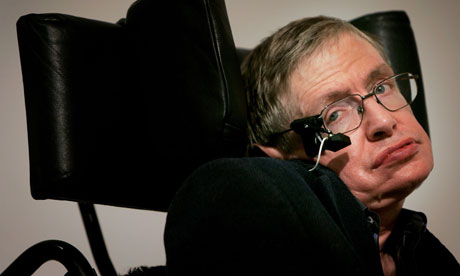
Book Review
By Stephen Hawking and Leonard Mlodinow
“The Grand Design”
Bantam Books, N.Y., 2010, hardcover 208 pp., $28 (often discounted)
(also available in audio and electronic display formats)
Down through the ages philosophers have asked, and have tried to answer, some pretty important questions: How can we understand the world in which we find ourselves? How does the universe behave? What is the nature of reality? Is their an objective reality? Where does all this come from? Did the universe need a creator?
Stephen Hawking, one of the world’s best known physicists and a great thinker-in-general, has written, after almost a ten year hiatus, a short new book that gives some surprising new answers to these and other ultimate questions of life.
He and Leonard Mlodinow, his co-author, say that, in today’s world, what was once the realm of philosophy is now the task of science. Philosophy is dead, they assert, because it has not kept up with developments in modern science, particularly physics. As a result, says Hawking, scientists have become the bearers of the torch in our quest for knowledge.
What he actually argues for is removal of the barriers that have stood so long between the fields of science and philosophy. His admiration of modern physics has to do with its ability to answer not just “how” questions but also “why” questions.
The wonderful thing about “The Grand Design” is that, in just under 181 pages, the authors, relying on science, give some credible answers to many of the so-called “great questions of life.” Have you ever read a concise, scientific explanation of how and why you can’t create a planet or a black hole out of nothing, while reading the how and why of creating an entire universe out of nothing?
Have you ever read a scientific explanation of why you exist?
Well, in this book you will!
Hawking and his co-author say a scientist must go much further than telling us when the universe began. The scientist must tell us how it began and why both the universe and we are here. The scientist must tell us why there is something rather than nothing.
Biologists have long told us that the laws of nature are so finely tuned that they allow for the existence of beings like ourselves but they don’t tell us why there are such laws. With science as their candle in the dark, Hawking and Mlodinow tackle this “why” question head-on. And they do it in simple, non-technical language.
I’m not going to give away the whole book but I do want to give a few more teasers – ones that made it tough to put this book down, even for the required mental absorption breaks.
You will read in the 181 pages that, according to quantum theory, the cosmos do not have a single existence or history, but rather that every possible history of the universe exists simultaneously. And, to bend the mind even a little more, you will read that, in quantum theory, even mere observation of phenomena changes that phenomena.
When applied to the universe as a whole, this idea calls into question the very notion of cause and effect.
If the past takes no definite form and we create history by observing it, rather than history creating us – what does that all mean? The authors argue that we ourselves are the product of quantum fluctuations in the very early universe, and they show how quantum theory predicts the reality of the “multiverse,” meaning ours is just one of many universes that appeared spontaneously out of nothing, each with different laws of nature.
If this isn’t enough to either blow your mind or tempt you into reading this book try resisting this: Basic to the whole book is a section that challenges the conventional concept of reality, replacing it with a “model-dependent” theory of reality that the authors describe as “the best we can hope to find.”
And for a last teaser: Included in the book is Hawking’s assessment of M-theory, which he describes as the only viable candidate for a complete “theory of everything.” If confirmed, the authors say, it will be the unified theory that Einstein and everyone since him have been looking for – the penultimate triumph of human reason.
A lot of readers will be uncomfortable with a lot of what is in this book. The material in the volume at the very least challenges common understandings and, for some, will threaten long-held and sometimes cherished belief systems.
But then again, down through the ages, hasn’t that always been the case whenever a new, good science book came out?
Photo: http://www.hawking.org.uk/

MOST POPULAR TODAY

High Court essentially bans demonstrations, freedom of assembly in Deep South

Zionist organizations leading campaign to stop ceasefire resolutions in D.C. area

UN warns that Israel is still blocking humanitarian aid to Gaza


U.S. imperialism’s ‘ironclad’ support for Israel increases fascist danger at home






Comments